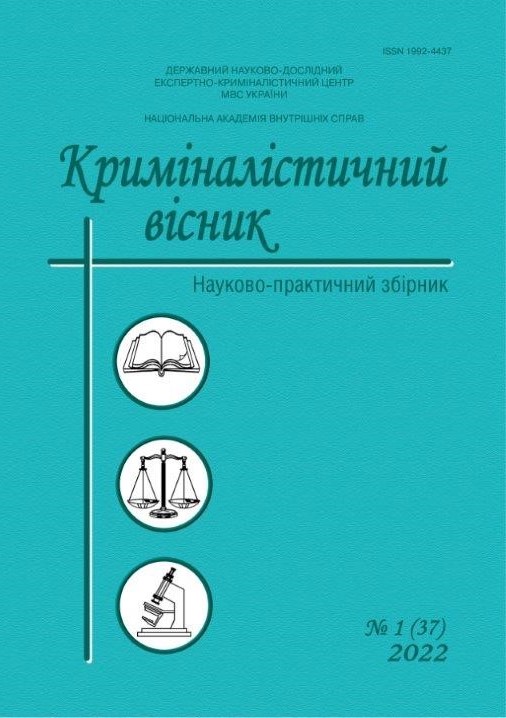МЕЖІ КОМПЕТЕНЦІЇ ЕКСПЕРТА ЩОДО ЗАСТОСУВАННЯ СТРОКІВ ПОЗОВНОЇ ДАВНОСТІ ПРИ ПРОВЕДЕННІ ЕКОНОМІЧНОЇ ЕКСПЕРТИЗИ У СПРАВАХ ПРО СТЯГНЕННЯ КРЕДИТНОЇ ЗАБОРГОВАНОСТІ З ПОЗИЧАЛЬНИКІВ
DOI:
https://doi.org/10.37025/1992-4437/2022-37-1-90Ключові слова:
кредитна заборгованість, строки позовної давності, кредитор, позичальник, судова економічна експертиа, компетенція, межі компетенції експерта, експертний висновокАнотація
Мета статті – окреслити межі компетенції експерта щодо застосування строків позовної давності під
час проведення економічної експертизи у справах про стягнення кредитної заборгованості з позичальників,
надати певні рекомендації. Методологія. Достовірність отриманих результатів і висновків забезпечується
сукупністю методів загальнонаукового і конкретно-наукового рівнів. Зокрема, методами аналізу та синтезу досліджено окремі складники кредитної заборгованості та її сукупність, порівняльним аналізом даних бухгалтерського обліку з вимогами нормативно-правового регулювання щодо строків позовної давності визначено належну до стягнення суму кредитної заборгованості. Наукова новизна. Обґрунтовано необхідність розроблення єдиної методології економічних досліджень із питань документального підтвердження кредитної заборгованості у спорах банків із позичальниками з метою правильного застосування експертами норм законодавства, складання об’єктивних експертних висновків та уникнення помилок під час проведення економічних експертиз. Висновки. Проаналізувавши практику застосування строків позовної давності
при проведенні економічної експертизи щодо стягнення кредитної заборгованості, можна констатувати, що відповідно до п. 2 ст. 107 Цивільного процесуального кодексу України експерт не має права самостійно вибирати будь-які вихідні дані для проведення експертизи, тобто й визначення дати та періоду заборгованості. Для формування єдиної практики проведення економічних досліджень із питань документального підтвердження кредитної заборгованості у спорах банків із позичальниками, правильного застосування норм законодавства та уникнення помилок експерти під час проведення економічних експертиз повинні досліджувати документи бухгалтерського обліку банків, зважаючи на строки позовної давності, зазначені судом. Якщо такі строки не зазначені в ухвалі про призначення експертизи, експерт зобов’язаний заявити клопотання про необхідність зазначити дати та строки позовної давності, а відповідно до п. 4. ст. 104 Цивільного процесуального кодексу України в разі необхідності суд може заслухати експерта щодо формулювання питання, яке потребує з’ясування, та за його клопотанням дати відповідні роз’яснення щодо поставлених питань. Зважаючи на уточнені запитання від суду, експерт зобов’язаний дати обґрунтований та об’єктивний письмовий висновок на поставлені йому питання. Засвідчено, що компетенцію експерта-економіста як учасника судового процесу, зокрема й під час розгляду справ про стягнення банками кредитної заборгованості з позичальників, обмежено законом, оскільки судовому експерту забороняється самостійно збирати дані, спиратися на інші вихідні дані крім тих, що надані сторонами (банком, позичальником), що або унеможливлює проведення експертизи,
або потребує уточнення судом періоду розрахунку кредитної заборгованості, із зазначенням дати та строків позовної давності. Сформульовано рекомендації, що можуть увійти до наявних методик проведення досліджень із визначення заборгованості за споживчими кредитами. Наголошено, що практичним застосуванням результатів проведеного дослідження є застосування єдиної практики при призначенні судових економічних експертиз, у поставлених питаннях для підтвердження заборгованості необхідно зазначати конкретні дати та періоди для проведення експертизи в межах строків позовної давності.



